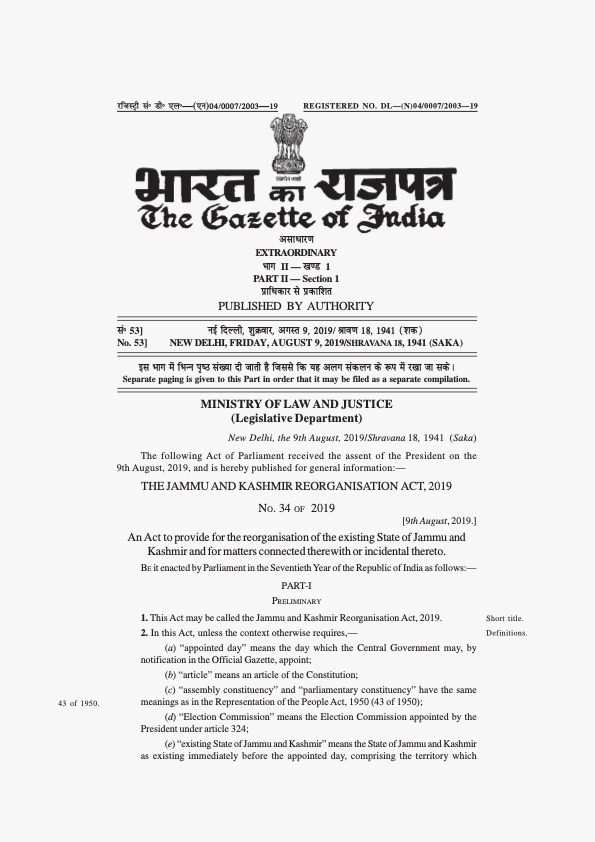The Industrial Relations Code, 2019 was introduced in Lok Sabha on November 28, 2019. It seeks to replace three labour laws: (i) the Industrial Disputes Act, 1947, (ii) the Trade Unions Act, 1926, and (iii) the Industrial Employment (Standing Orders) Act, 1946.. It covers trade unions and labour. Under the Code, seven or more members of a trade union can apply to register it. Trade unions that have a membership of at least 10% of the workers or 100 workers, whichever is less, will be registered. Further, a registered trade union must always have at least seven workers who are employed in the establishment or the connected industry, as its members. The central or state government may recognise a trade union or a federation of trade unions as Central or State Trade Unions respectively. The salient features of the IR Code is as below:
Negotiating unions: The Code provides for a negotiation union in an industrial establishment for negotiating with the employer. If there is only one trade union in an industrial establishment, then the employer is required to recognise such trade union as the sole negotiating union of the workers. In case of multiple trade unions, the trade union with support of at least 75% of workers will be recognised as the negotiating union by the central or state government.
Unfair labour practices: The Code prohibits employers, workers, and trade unions from committing any unfair labour practices listed in a Schedule to the Code. These include: (i) restricting workers from forming trade unions, (ii) establishing employer sponsored trade union of workers, and (iii) coercing workers to join trade unions.
Standing orders: All industrial establishments with at least 100 workers must prepare standing orders on matters listed in a Schedule to the Code. The central government will prepare model standing orders on such matters, based on which industrial establishments are required to prepare their standing orders. These matters relate to: (i) classification of workers, (ii) manner of informing workers about hours of work, holidays, paydays, and wage rates, (iii) termination of employment, (iv) suspension for misconduct, and (v) grievance redressal mechanisms for workers.
Lay-off and retrenchment: The Code defines lay-off as the inability of an employer, due to shortage of coal, power, or breakdown of machinery, from giving employment to a worker. It also provides for employers to terminate the services of a worker, i.e., retrenchment. Employers of industrial establishments such as mines, factories and plantations with at least 100 workers are required to take prior permission of the central or state government before lay-off, retrenchment or closure. The central or state government can modify this threshold number of workers by notification. Any person who contravenes this provision is punishable with a fine between one lakh rupees and Rs 10 lakh.
Industrial establishments in which 50 to 100 workers are employed, are required to: (i) pay 50% of basic wages and dearness allowance to a worker who has been laid off, and (ii) give one month’s notice and wages for such period to a worker who has been retrenched. Any person who contravenes this provision is punishable with a fine between Rs 50,000 and two lakh rupees. Further, if an employer proposes to re-employ retrenched workers, such workers will have preference over other persons.
Resolution of industrial disputes: The central or state governments may appoint conciliation officers to mediate and promote settlement of industrial disputes. These officers will investigate the dispute and hold conciliation proceedings to arrive at a fair and amicable settlement of the dispute. If no settlement is arrived at, then any party to the dispute can make an application to the Industrial Tribunal.
Industrial Tribunals: The Code provides for the constitution of Industrial Tribunals for the settlement of industrial disputes. An Industrial Tribunal will consist of two members: (i) a Judicial Member, who is a High Court Judge or has served as a District Judge or an Additional District Judge for a minimum of three years; and (ii) an Administrative Member, who has over 20 years of experience in the fields of economics, business, law, and labour relations. The central government may also constitute National Industrial Tribunals for settlement of industrial disputes which: (i) involve questions of national importance, or (ii) could impact industrial establishments situated in more than one state. Members of the National Industrial Tribunal will include: (i) a Judicial Member, who has been a High Court Judge, and (ii) an Administrative Member, who has been a Secretary in the central government.

